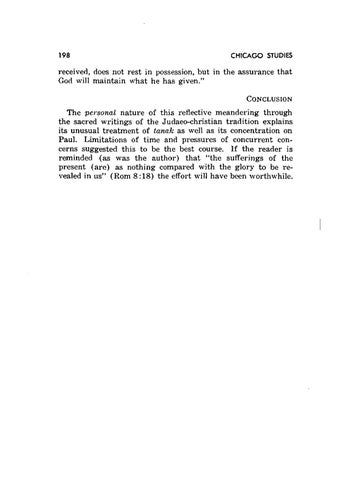198
CHICAGO STUDIES
received, does not rest in possession, but in the assurance that God will maintain what he has given." CONCLUSION
The personal nature of this reflective meandering through the sacred writings of the Judaeo-christian tradition explains its unusual treatment of tanak as well as its concentration on Paul. Limitations of time and pressures of concurrent concerns suggested this to be the best course. If the reader is reminded (as was the author) that "the sufferings of the present (are) as nothing compared with the glory to be revealed in us" (Rom 8 :18) the effort will have been worthwhile.
